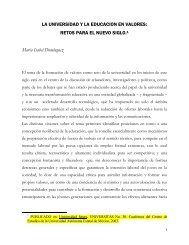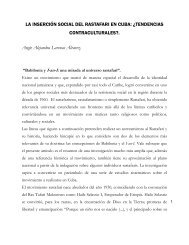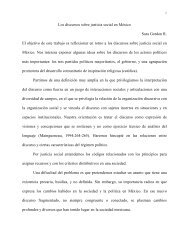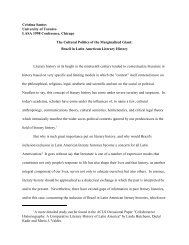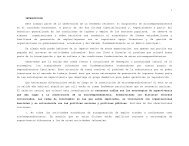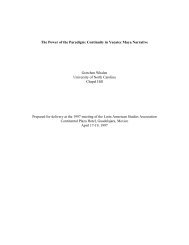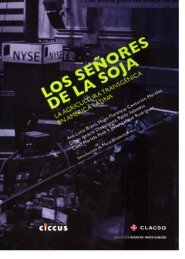the role of ideas in the construction of alternatives - Clacso
the role of ideas in the construction of alternatives - Clacso
the role of ideas in the construction of alternatives - Clacso
You also want an ePaper? Increase the reach of your titles
YUMPU automatically turns print PDFs into web optimized ePapers that Google loves.
NEW WORLDWIDE HEGEMONY. ALTERNATIVES FOR CHANGE AND SOCIAL MOVEMENTSMiddle East. In Spa<strong>in</strong>, Italy, France, Germany, Brita<strong>in</strong>, millions <strong>of</strong> peoplecame out <strong>in</strong>to <strong>the</strong> streets to express <strong>the</strong>ir opposition to <strong>the</strong> <strong>in</strong>vasion<strong>of</strong> Iraq –even many United States citizens chose to demonstrateaga<strong>in</strong>st this war. The center <strong>of</strong> gravity <strong>of</strong> <strong>the</strong> <strong>in</strong>ternational pacifistmovement has undeniably been European. How much hope may beplaced on <strong>the</strong> reach <strong>of</strong> this major reaction by European public op<strong>in</strong>ion?Could it have been a merely immediate and ephemeral impulse?What was undoubtedly <strong>in</strong>fluential was <strong>the</strong> undisguisable hostility visà-vis<strong>the</strong> policy <strong>of</strong> <strong>the</strong> White House, which cont<strong>in</strong>ues to be reflected <strong>in</strong>all surveys follow<strong>in</strong>g <strong>the</strong> war, as well as <strong>in</strong> a torrent <strong>of</strong> articles, manifestosand outpour<strong>in</strong>gs <strong>in</strong> <strong>the</strong> mass media <strong>of</strong> <strong>the</strong> ma<strong>in</strong> countries on <strong>the</strong>cont<strong>in</strong>ent. A concrete aspect <strong>of</strong> this recent wave <strong>of</strong> anti-U.S. sentimentis <strong>the</strong> affirmation <strong>of</strong> a historical identity, perta<strong>in</strong><strong>in</strong>g to European societiesand absolutely different from that <strong>of</strong> <strong>the</strong> United States. Thephilosopher J. Habermas and many o<strong>the</strong>r European <strong>in</strong>tellectuals andpoliticians <strong>the</strong>orize <strong>the</strong>se differences as a contrast <strong>in</strong> values. Europecont<strong>in</strong>ues to be more humane, more tolerant, more pacific and sociallymore responsible with regard to <strong>the</strong> people governed than its UnitedStates counterpart.It is clear that <strong>the</strong> European capitalist model has, s<strong>in</strong>ce <strong>the</strong>Second World War, been more regulatory and <strong>in</strong>terventionist than that<strong>of</strong> <strong>the</strong> U.S., and that no European state, and <strong>the</strong> European Union evenless so, enjoys a remotely comparable military power to that atWash<strong>in</strong>gton’s disposal. But nowadays neoliberalism reigns <strong>in</strong> allEuropean societies with <strong>the</strong> same watchwords as <strong>in</strong> <strong>the</strong> rest <strong>of</strong> <strong>the</strong>world <strong>in</strong> terms <strong>of</strong> reduction <strong>of</strong> government expenditure, reduction <strong>of</strong>social benefits, deregulation <strong>of</strong> markets, privatization <strong>of</strong> <strong>in</strong>dustriesand public services. In this regard <strong>the</strong> structural differences between<strong>the</strong> European Union and <strong>the</strong> United States are ever smaller. Whatappears is a vague notion that alludes to <strong>the</strong> existence <strong>of</strong> a cultural differencebetween those political units, although, obviously, with everypass<strong>in</strong>g year European societies f<strong>in</strong>d <strong>the</strong>mselves more subord<strong>in</strong>ated to<strong>the</strong> products <strong>of</strong> Hollywood and <strong>of</strong> Silicon Valley. Never<strong>the</strong>less, thisEuropean distance or cultural reaction which we referred to constitutesa very weak basis <strong>in</strong> terms <strong>of</strong> a last<strong>in</strong>g political resistance to <strong>the</strong>United States. This is very clearly seen <strong>in</strong> <strong>the</strong> fact that <strong>the</strong> overwhelm<strong>in</strong>gmajority <strong>of</strong> <strong>the</strong> demonstrators aga<strong>in</strong>st <strong>the</strong> Iraq war should havefervently supported <strong>the</strong> war aga<strong>in</strong>st Yugoslavia, whose justificationand modus operandi were more or less identical. The ma<strong>in</strong> differenceappears to center on <strong>the</strong> fact that at that time <strong>the</strong> president was Bill40




